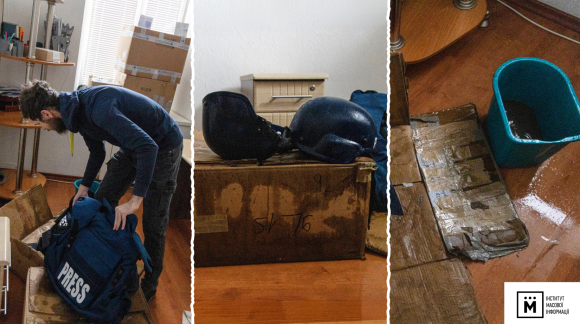Columnist Victoria Moriweather (pseudonym. – Ed.) reported receiving insults both in private messages and publicly after the release of her article “Nudes for army donations: what’s wrong about it?” on the website “Povaha”. Victoria considers some of the messages as death threats.
She reported this on Facebook.
In her article, the columnist said that it was dangerous for women to take and sell their nude photos for a donations to the Armed Forces and explained what risks and what consequences the model faces, in her opinion.
In her comment to IMI, Victoria Moriweather noted that a few hours after the article was posted, many people made the same kind of offensive comments under it and on her personal Facebook page. These, she says, included accusations, death threats (or threatening hints) and profane language.
According to her, for the most part these were not overt death threats, but comments hinting at what “should be done, and what a pity we didn’t meet.”
“But most of the comments were insulting my hobbies (Tarot cards. – Ed.) and my personality,” Victoria Moriweather said.
“The root cause (of the conflict that led to insults. – Ed.) was one post. I replied to some of them quite rudely, since I had never encountered such massive hate and did not really understand how to behave in a stressful situation. There are still a lot of comments of this kind under my article on the ‘Povaha’ page. Later, I had to make my page private,” Victoria said.
At the same time, “Povaha” editors announced they were terminating their contract with Victoria Moriweather. This happened after the author of the article and military officer Alina Sarnatska had a public conversation involving profane language. The officer disagreed with the content of Victoria’s article.
“We have respect for different opinions, even if they do not align with the vision expressed in our materials. However, we do not tolerate death threats, personal attacks, insults, especially with obscene language,” Povaha wrote on Facebook.
“Povaha” stressed that “attacks, insults addressed to soldiers or mocking of their personal traits are absolutely unacceptable” to their team.
“Their service and their choice to defend our country deserve unconditional respect and gratitude. We owe our lives and our opportunity to write any materials or social media comments at all to the military,” the post reads.
“Povaha” also noted: despite the issues raised in the article being important and worth discussing, “the author’s comments on social media do not in any way reflect ‘Povaha’s’ position.”
“That is why we decided to stop working with her. We thank Victoria for her columns, and this decision was not easy for us. We also want to remind everyone that threats and harassment on social media are legally punishable,” the post adds.
Most of the comments under this post are now in support of the columnist.
In her comment to IMI, Lyudmyla Pankratova, the CEO of the Regional Press Development Institute, which coordinates “Povaha”, noted that the editors do not know who was sending death threats to the columnist and what the death threats were.
“In our post about the termination Ms. Victoria Moriweather’s contract, we were talking specifically about the unacceptable conversation that arose between Ms. Alina and Ms. Victoria,” Pankratova said.
She noted that the editors tried to prevent the conflict that the discussion of Victoria’s article led to. She believes that the attempt failed.
“Because the situation that broke out between the author Victoria Moriweather and Alina Sarnatska exposed a whole layer of sensitivities: putting the military and civilians in opposition to one another, the society’s emotional tension caused by the war and the general incapacity to lead a polite and constructive discussion, a problem of especially critical scale on social media,” explained Pankratova.
According to her, the termination Victoria’s contract “was a difficult decision which we had to make, by no means unanimous in the team.”
“So to those commenters who said that we were taking our sweet time before simply firing the author, we want to assure you: yes, we really took a long time to think everything through, because the people we work with and those we work for are valuable to us. And we tried to mediate between Ms. Alina and our columnist, but were not fully successful,” Pankratova said.
She also explained that the editors did not delete the column because they do not see it as a violation of their standards, and “so that anyone can access the original source and form their own opinion about the text.”
“However, we were saddened by Victoria’s further communication as a ‘Povaha’ author, by both parties switching to personal attacks and mutual insults. And here we honestly admit that we failed to communicate the differences in values properly to the public or establish a dialogue with the author associated with the media outlet. The obscene language and comments about the soldiers’ mental state are unacceptable for us, and this became the decisive factor in the difficult decision to end our cooperation”, Lyudmyla Pankratova summarized, stressing that “Povaha” condemns any death threats or harassment and, despite the termination of contract, promises to support the columnist if she applies for the protection of her rights because of the death threats.
Alina Sarnatska commented to the IMI that the situation was not a conflict between her and the author of the article. “Everything was happening on an open platform,” the officer added. She says that one can figure everything out by scrolling through her page, as the comments are there. “I demanded respect for female soldiers and volunteers from ‘Povaha,'” Sarnatska wrote.
Victoria Moriweather, in her turn, noted that Alina Sarnatska blocked her right after her post, but that she was always ready for dialogue.

